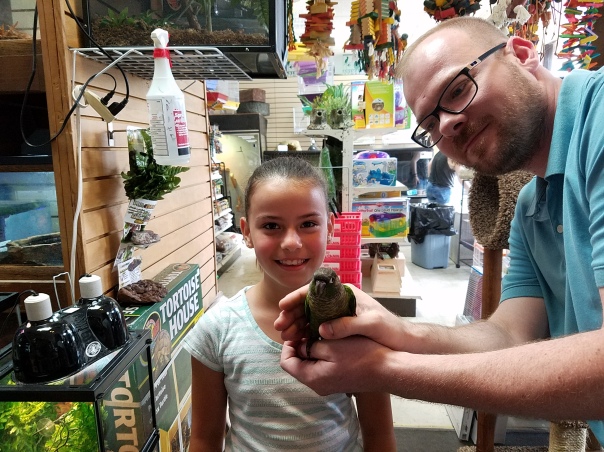
Big Savings this Weekend
There are all kinds of big savings going on this weekend at The Animal Store. Here are just of few of the deals. Sale ends 5:00 p.m. Sunday, December 11.

Ask the vet … are reptiles scary?
by Dr. Kristin Claricoates
Chicago Exotics Animal Hospital
 Some may call them cute
Some may call them cute
Others are a little wary.
Don’t be afraid, though,
Reptiles aren’t that scary!
Happy October! Did you know that October 21 is Reptile Awareness Day? When considering a reptile as a pet, it can be a little daunting to determine exactly what they need—especially when they are growing. Some common pet reptiles include ball pythons, bearded dragons, and leopard geckos.

I myself have a ball python named Dorian (a fantastic reference to the lovely scales of my snake. Did you know Dorian is a type of musical scale? I digress …) who is my cuddle bug when I settle in for an evening of reading or watching a movie.
Contrary to what many people think, you have nothing to be scared of from these sweet-natured pets. This is what makes them so popular. But which one may be right for you, and where do you begin? If you are a night owl, ball pythons and leopard geckos may be your pet of choice. If your free during the day, the bearded dragon may make a great addition to your family. For easy reference, here is a quick chart of pet reptile facts. This is just a summary of the basics. The folks at The Animal Store can answer your more detailed questions.

If you are considering a reptile, please be sure to have him or her checked over by a veterinarian to make sure your new pet is healthy and so a vet can answer all the questions you have about your pet.
We were not able to discuss all reptiles above, so I covered three of the pets most commonly owned in the reptile world. Here are links to our snake and reptile care sheets, which include a good number of other common cold blooded critters we see. The care sheets discuss the care and handling of each species listed, as well as food and enclosure requirements.
Finally, I would like to recognize two groups that appreciate reptiles everyday:
- our local reptile rescue—Friends of Scales—for doing a fantastic job finding a second forever home for some of these little guys. To volunteer or donate, contact Friends of Scales.
- Chicago Herpetological Society, which meets the last Wednesday of the month at the Peggy Notebart Museum to discuss and educate people on reptiles.
Welcome to Ask the Vet, a regular feature on The Animal Store Blog. We have teamed up with the great veterinarians at Chicago Exotics Animal Hospital, who will answer your most pressing pet questions right here! Do you want to see your question answered on the blog? Leave a comment below or submit it on our contact form.
Fall is for Ferret

OK, we’re about a week early (fall officially starts Tuesday, September 22), but we’re really excited about ferrets. So excited, in fact, that for every ferret we sell between now and October 8, The Animal Store will donate $25 to the Greater Chicago Ferret Association.
On October 8, the Greater Chicago Ferret Association is sponsoring the Greatest Ferret Show on Earth. Held at the Kane County Fair Grounds (525 S. Randall Road, St. Charles), tickets are $7 for adults, $3 for children 12 and under, and $14 for the family. Proceeds go to the Greater Chicago Ferret Association’s no-kill shelter. Look for one of our favorite vets from Chicago Exotics Animal Hospital, who will be giving a speech about heart disease in ferrets in the late afternoon.
For every ferret we sell between now and October 8, The Animal Store will donate $25 to the Greater Chicago Ferret Association
Speaking of our favorite vets, here they are to offer answers to some of your most frequently asked ferret questions.
Ask the Vet … about ferrets
Q: What does a first time owner need to know about ferrets?
A: Ferrets are true carnivores. This means they need meat-based protein, such as Marshall ferret kibble or even whole prey. The majority of pet ferrets (including those at The Animal Store) come from a place called Marshall farms. These ferrets have already been spayed or neutered, and are de-scented (which means the glands that produce strong smells have been removed). Ferrets typically live 7-9 years, and both females and males reach maturity between 8-12 months.
Ferrets are very friendly and active, playing often, but they also love to sleep on and off throughout the day. Like cats, ferrets can be litter-box trained fairly easily. Simply keep the litter box tidy and empty it daily. If your ferret is not using the litter box, pick up the feces and place them in the litter box. This helps ferrets understand the idea of where to defecate. Be sure to empty the box at the end of every day.
Young ferrets are commonly rascals, getting into things or trying to eat things they should not, so always be aware of where your ferret is and what he or she is doing. Ferrets can get a gut upset that causes soft, slimy stool and is a serious illness. If you notice this, see a vet trained in exotic pet care as soon as possible.
Q: What routine vet visits are needed for a ferret?
A: Plan on seeing an exotic pet vet twice a year with your ferret: once for an annual exam and a distemper booster, and once for a rabies vaccine. Young ferrets may also require more visits that initial year if any irregularities are noted. At the annual exam, we recommend a fecal assessment to check for bacterial upsets and parasites. If your ferret goes outdoors, we also strongly suggest heart-worm testing and prevention. Lastly, for ferrets three years and older, we highly recommend blood work to assess organ functions and signs of infections or other abnormalities.
Ask the Vet is a regular feature on The Animal Store Blog. We have teamed up with the great veterinarians at Chicago Exotics Animal Hospital, who will answer your most pressing pet questions right here! Do you want to see your question answered on the blog? Leave a comment below or submit it on our contact form.
Photo credit: GaborfromHungary via Morguefile.com
Wordless Wednesday #26: Green Cheek Conure

It’s been a while since our last Wordless Wednesday, so here are some happy new pet owners to brighten your day: Mikaela and her dad Michael are ready to take their Green Cheek Conure home.
Photos from the Harry Potter Party with The Animal Store

Here are some of our favorite photos from launch party of Harry Potter and the Cursed Child, held in conjunction with the City of Evanston and Northwestern University on Saturday, July 30, 2016. Kenn had a blast as an American Hagrid, showing off such magical creatures as:
- an umbrella cockatoo
- Spur the giant Sulcata tortoise
- a legless lizard
- a tarantula
- a hedgehog
- a bearded dragon (everyone’s favorite kind of dragon)
- a smooth-sided toad
- Kenn and the Pink Toe Tarantula
- Olivia and the Legless Lizard
- Noelle and the Umbrella Cockatoo
- Kenn and the Legless Lizard
- Umbrella Cockatoo
- Kenn and the Legless Lizard
- Kenn and the Legless Lizard
- Kenn and the Legless Lizard
- Pink Toe Tarantula
- Noelle, Kenn and the Umbrella Cockatoo
- Kenn and the Legless Lizard
- Smooth-sided Toad
- Kenn at the Evanston Harry Potter Party
- Kenn and the Bearded Dragon
- Hedgehog (Kenn always has something up his sleeve)
- Kenn and the Umbrella Cockatoo
Harry Potter, The Animal Store, and Magical Creatures
 Did you know that Kenn (that’s right, our own Kenn Bearman, owner of The Animal Store) leads a double life. By day—and to the Muggle World—he is a mild-mannered pet shop owner. But to the wizarding world, he is the American equivalent of Hagrid—gameskeeper and professor of Magizoology—the care and keeping of magical creatures.
Did you know that Kenn (that’s right, our own Kenn Bearman, owner of The Animal Store) leads a double life. By day—and to the Muggle World—he is a mild-mannered pet shop owner. But to the wizarding world, he is the American equivalent of Hagrid—gameskeeper and professor of Magizoology—the care and keeping of magical creatures.
Tonight, as part of a day-long celebration of the launch of Harry Potter and the Cursed Child, Kenn will be showing off his Magizoological knowledge with a very special Animal Show. All are welcome to the steps of the Deering Library on Northwestern’s campus, where you will get to see a whole variety of fascinating creatures. And here’s a little secret we learned from Kenn—all creatures are magical.
Saturday, July 30, 2016
Steps of the Deering Library
Northwestern University
1970 Campus Dr.
Evanston, IL
Ask the Vet … about Hamsters

Russian Dwarf hamster*
You asked: What should I know about adopting a hamster?
Answer: Dwarf hamsters are solitary or social; Syrian hamsters are solitary
Syrian hamsters and Chinese hamsters, unlike chinchillas, are solitary pets. Syrian hamsters include:
- golden hamsters
- teddy bear hamsters
- black bear hamsters
- panda bear hamsters
- polar bear hamsters
Except for mating or raising young, these hamsters should not share a cage as they will fight and can cause serious injuries to each other.
Dwarf hamsters, on the other hand, can be kept in same sex pairs or small groups, but make sure you allow enough space if you have several hamsters in one enclosure. If you see any signs of aggression in these same sex pairs or small groups, be prepared to separate them permanently.
Hamsters are most active in the evening and nighttime. They may not appreciate being handled in the daytime hours and can possibly bite. Poor vision paired with the disorienting and scary experience of getting scooped up by an owner during the daytime (when previously asleep) can lead to the potential for a hamster bite. We recommend that you go slow with your new pet and allow him or her to adjust to you. Spending a moderate amount of time with your pet is key to having a friendly and well-adjusted hamster.
Have more questions about hamsters? Leave it in a comment below.
Welcome to Ask the Vet, a regular feature on The Animal Store Blog. We have teamed up with the great veterinarians at Chicago Exotics Animal Hospital, who will answer your most pressing pet questions right here! Do you want to see your question answered on the blog? Leave a comment below or submit it on our contact form.
*Photo credit: Russian Dwarf hamster by cdrussorusso via a Creative Commons license.
Ask the Vet … about Adopting Chinchillas
You asked: What should I know about adopting a chinchilla?
Answer: Chinchillas are social.
 We highly recommend the book Behavior of Exotic Pets by Valarie V. Tynes as a way to begin to understand any exotic pet. Chinchillas, if it can be helped, should not be solitary animals; they should be housed in same sex pairs or in groups.
We highly recommend the book Behavior of Exotic Pets by Valarie V. Tynes as a way to begin to understand any exotic pet. Chinchillas, if it can be helped, should not be solitary animals; they should be housed in same sex pairs or in groups.
Although not ideal, chinchillas can live alone. If you plan to keep a solitary chinchilla for a pet, make sure to give your chinchilla plenty of attention. We recommend at least an hour of socialization with your chinchilla each and every day.
If you decide to keep a group of chinchillas, the group should consist of two males, two females, or one male and two or more females. The male(s) should already be neutered. If you are not purchasing chinchillas from the same litter or are adopting chinchillas that are not already familiar with one another, you need to introduce them carefully. Here are some suggestions we like from the book:
- The initial meeting:
- should be in a neutral territory with a large space, like a room, and should include a dust bath.
- alternatively, have separate cages in the same vicinity. The cages should be new so there are no residual scents. If the cages are used, they should be cleaned well with a scent-reducing oxidizing agent.
- or, place a smaller cage within a large cage—the large cage should not be the resident chinchilla’s cage.
- Make sure the animals tolerate each other well in the large area before putting them in the same cage. If a female is being introduced to a male, do it in the male’s cage.
Like any pet, you should learn as much as you can about chinchillas before you adopt one or more into your family. Here are a few things to think about when considering chinchillas:
- they are a long term responsibility; chinchillas can typically live for 10-15 years.
- they are crepuscular, which means they are most active at dawn and dusk.
Have more questions about chinchillas? Leave it in a comment below.
Welcome to Ask the Vet, a regular feature on The Animal Store Blog. We have teamed up with the great veterinarians at Chicago Exotics Animal Hospital, who will answer your most pressing pet questions right here! Do you want to see your question answered on the blog? Leave a comment below or submit it on our contact form.
Ask the Vet … about Bunnies!
Welcome to Ask the Vet, a new regular feature here on The Animal Store Blog. We have teamed up with the great veterinarians at Chicago Exotics Animal Hospital, who will answer your most pressing pet questions right here! Do you want to see your question answered on the blog? Leave a comment below or submit it here on our contact form.
This edition of Ask the Vet is about bunnies.
 You asked: This is my first pet rabbit. What should I feed it?
You asked: This is my first pet rabbit. What should I feed it?
Answer
Excellent question! Depending on your rabbit’s age, they may require different foods. A good rule of thumb is that rabbits under six months of age should be fed alfalfa hay and alfalfa hay-based pellets, and offered leafy greens only sparingly in small amounts, if at all (to prevent soft stool; the high water content of greens can cause diarrhea). As a rabbit ages beyond six months, we recommend feeding timothy hay freely for life, as well as leafy greens twice daily (the quantity depends on the size of the rabbit). Pellets are not needed for adult rabbits. Some breeds, especially larger rabbit breeds, may need pellets for a little while past six months of age. If you’re unsure, ask the staff at The Animal Store, Chicago Exotics Animal Hospital, or your veterinarian. ![]()
Do not offer your rabbit:
- carrots, broccoli (or any gas causing vegetables)
- greens high in calcium (kale, collard greens, and swiss chard for example)
- fruit to your rabbit
Despite what you might have learned from Bugs Bunny, carrots and the types of fruits and vegetables mentioned above can cause gut upset, which could become a serious problem in your rabbit.
You had more questions about rabbits, so tune in for the next edition of Ask the Vet for more answers. Enter your email address to the left so you don’t miss a single post. Stop in any time and our expert staff at The Animal Store is happy to answer questions in person and help you find the supplies you need to keep your pet happy and healthy. See you soon!

















